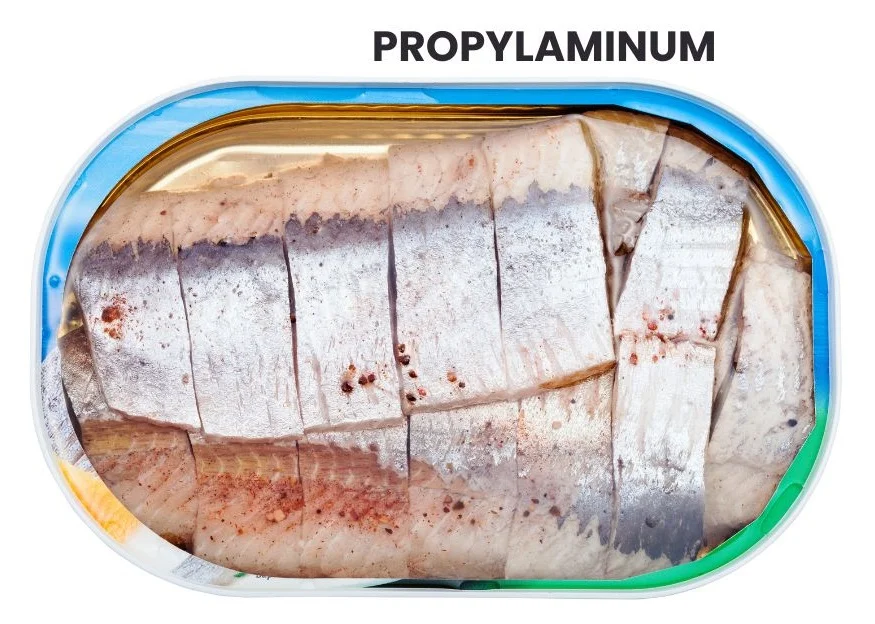Propylaminum, also known as Trimethylaminum or Distilled Herring-brine, is a substance used in homeopathy primarily for treating acute rheumatism and related conditions.
It is used to alleviate symptoms associated with acute rheumatism, including fever, pain, and specific manifestations like rheumatic prosopalgia (facial pain) and metastatic rheumatic heart lesions.

Table of Contents
ToggleSOURCE INFORMATION
Scientific Classification: Homeopathic remedy derived from distilled herring-brine.
- Kingdom: Animalia
- Phylum: Chordata
- Class: Actinopterygii
- Order: Clupeiformes
- Family: Clupeidae
- Genus: Clupea
- Species: Clupea harengus (Atlantic herring), Clupea pallasii (Pacific herring)
Origin and Distribution
- Herring-brine is derived from the brining process of herring, a small, oily fish found in the temperate and subarctic waters of the North Atlantic and North Pacific Oceans.
- Herring is traditionally caught and processed in countries such as Norway, Iceland, Canada, and the United States, where it has been a staple food for centuries.
Description: Herring-brine is the salty, flavorful liquid left over after herring is cured in a mixture of salt and water. This brining process is essential for preserving the fish, enhancing its flavor, and preventing spoilage.
Historical and Medicinal Uses
- Traditional Uses: Historically, herring-brine has been utilized for its medicinal properties, particularly in folk medicine.
- It was often used for treating ailments such as arthritis and rheumatism due to its supposed anti-inflammatory effects.
- The high salt content and the presence of compounds like trimethylamine and propylaeamine were believed to provide therapeutic benefits.
- Homeopathic Uses: In homeopathy, herring-brine, particularly the compound propylaeamine (trimethylamine), is used to address acute rheumatism and related conditions.
- It is believed to alleviate symptoms such as pain, restlessness, and joint discomfort.
DRUG PATHOGENESIS
- Propylaminum is believed to work by addressing the inflammatory processes associated with acute rheumatism.
- It is said to dissipate fever and reduce pain within a short period, typically one to two days.
- Its action may involve modulating immune responses and restoring balance to the affected areas.
KEY CHARACTERISTICS
- Rheumatic Symptoms: Effective in acute rheumatism with fever and severe pain.
- Facial Pain (Prosopalgia): Specifically indicated for rheumatic pain affecting the face.
- Heart Lesions: Helps in cases where rheumatic inflammation affects the heart.
PARTICULAR ORGAN SYMPTOMS
EXTREMITIES
- Pain in Wrists and Ankles: Pain worsens with the slightest motion (similar to Bryonia).
- Restlessness and Thirst: Patient exhibits great restlessness and thirst during symptoms.
- Numbness and Tingling: Tingling and numbness in fingers.
- Weakness: Sensation of heaviness in limbs, such that holding small objects like needles becomes difficult.
MODALITIES
- Aggravation: Symptoms worsen with the slightest motion (Bryonia-like aggravation).
- Restlessness and Thirst: Symptoms accompanied by intense restlessness and thirst.
- Amelioration: Specific ameliorating factors are not detailed in the provided information.
WHAT ARE MODALITIES IN HOMOEOPATHY?
RELATIONSHIP WITH OTHER DRUGS
- Chenopodium Vulvaria: Shares a relationship possibly due to both containing Propylamine.
- Chenopodium Vulvaria is known for weakness in the lumbar and lower dorsal region, suggesting a similarity in some symptoms or actions.
DOSE
- Generally recommended dose is ten to fifteen drops of the remedy in about six ounces of water, with a teaspoonful taken every two hours.
Frequently Asked Questions
What is Propylaminum used for?
- It is used primarily for acute rheumatism, including symptoms of fever, severe pain, and rheumatic heart lesions.
How does Propylaminum work?
- It works by dissipating fever and alleviating pain associated with acute rheumatism, potentially through its action on inflammatory processes.
Are there any side effects of using Propylaminum?
- As with all homeopathic remedies, side effects are minimal due to the highly diluted nature of the preparation. However, individual sensitivities can vary.
Meaning of Difficult Words
- Propylaminum: Homeopathic remedy derived from distilled herring-brine.
- Trimethylaminum: Another name for Propylamine, a component of Propylaminum.
- Prosopalgia: Facial pain.
- Metastases: Spread of disease from one part of the body to another.
- Lumbar: Relating to the lower back.
- Dorsal: Relating to the upper back or spine.
This summary provides an overview of Propylaminum’s characteristics, usage, and therapeutic indications based on available homeopathic literature.
Always consult with a qualified homeopath or healthcare provider before starting any new treatment regimen.
